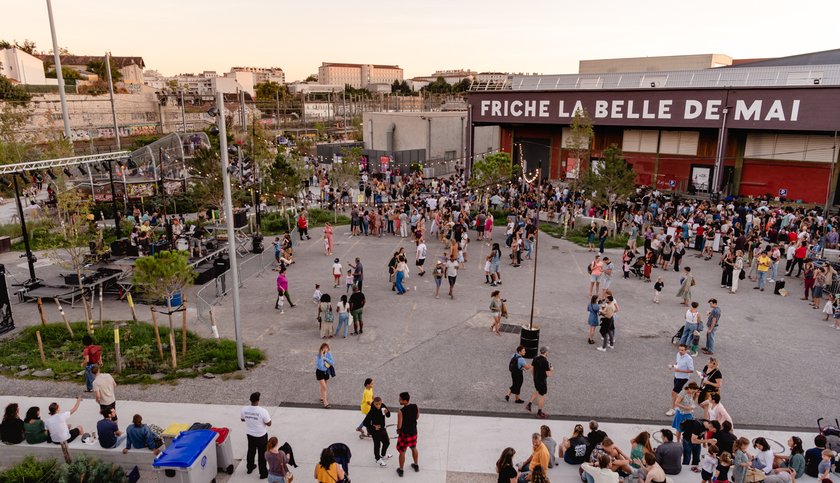TEH Conference 101 in Marseille
This upcoming spring we are meeting in Marseille, France - for the 101th time! We will be hosted by our member centre Friche la Belle de Mai a former tobacco factory that has been transformed into a cultural space since 1992. The theme of this year's Conference is "Imagining Within Limits: Cultural Centres and Planetary Boundaries". #TEH101 Conference is open for everyone: TEH members and TEH supporters!
Why imagining within limits: cultural centres and planetary boundaries?
In today’s world, the role of the creative and cultural centres have become a major strategic issue, at the intersection of ecological transition, public policy, cultural production models, and our relationship with local territories.
Such centres are already directly impacted: destabilised economic models (declining attendance, rising energy costs, scarcity of materials), events cancelled or relocated due to heatwaves. These disruptions deeply challenge the viability of our current activities and services.
But beyond these observations, our role is essential. We hold a double responsibility: to inform of course, to adapt, but also to drive transformation. As spaces of creation and experimentation, we have the power to generate alternative narratives and desirable imaginaries in response to the crisis, offering a perspective beyond the often anxiety-inducing scientific discourse. We also have the ability to connect with audiences in a different way, and to spark new ways of thinking, living, and organising society.
At La Friche, the team is now fully committed to a path of ecological redirection. This is not simply about technical transition, it is a profound questioning of our uses, our purposes, and our relationship to place. The ambition is to contribute to a deep and structural transformation of our practices.
What must we stop, transform, or reinvent in order to stay within planetary boundaries?
Interested to join?
Two categories of tickets are now available:
- SOLD OUT: Early-bird tickets for Trans Europe Halles members - EUR 150.
- Regular tickets for Trans Europe Halles members - EUR 180.
- Regular tickets for non-members - EUR 210.
You can purchase multiple tickets at once, but make sure to include the name, surname and email address of each participant. Please note: this time, there will be no discounted group tickets, youth tickets or one-day tickets.
Don’t wait too long - early-bird spots go fast!
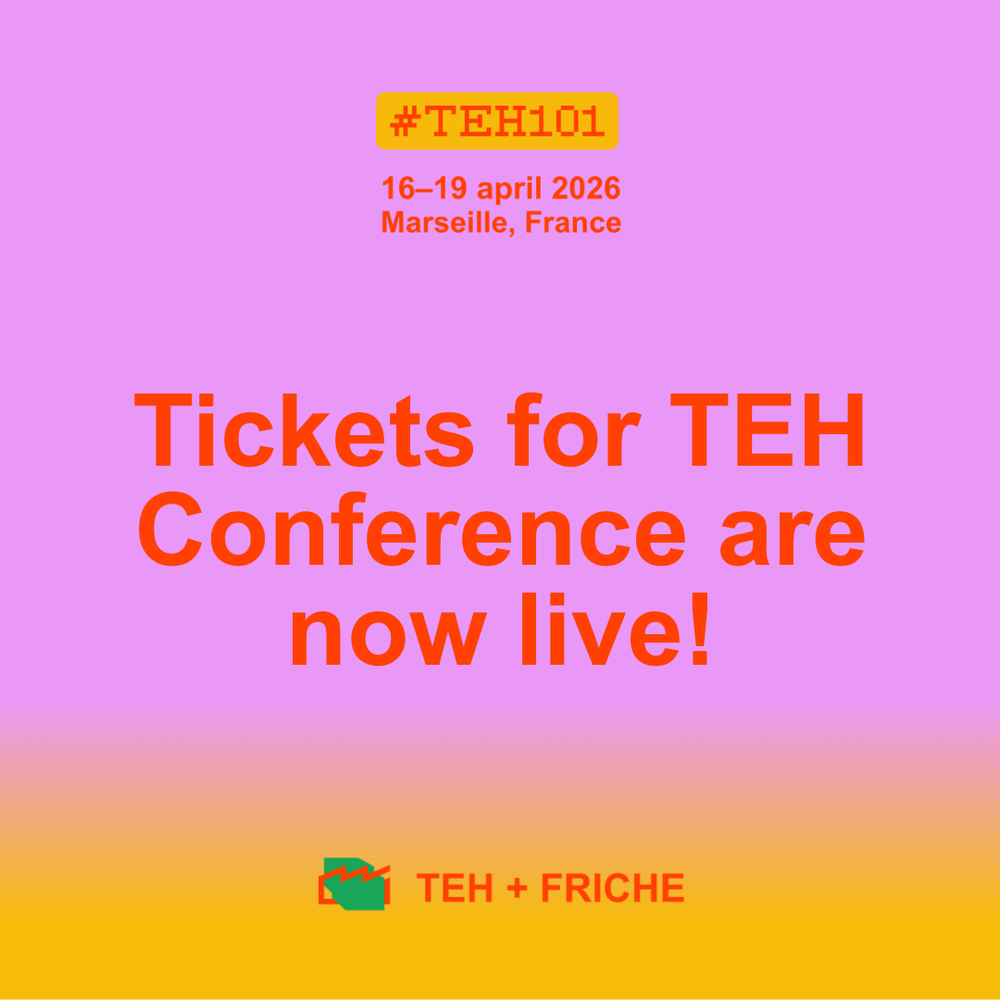
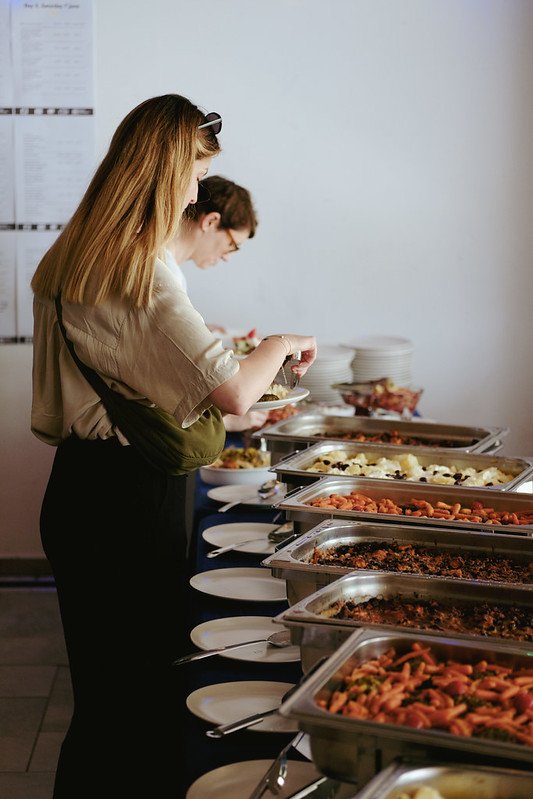
Each ticket includes:
- Access to 30+ insightful sessions, workshops and side-events.
- Evening artistic programme and parties.
- Lunches and dinners from Thursday afternoon (16 April) to Saturday evening (18 April).
- The opportunity to meet 200+ cultural professionals from all over Europe and beyond.
- Access to Swapcard, the TEH event coordination app: register for sessions in advance, connect with participants, and stay in touch during and after the event.
- A group photo and event photography stored in an open digital archive to remember it all.
Photo: TEH99 by ©Léo Lethielleux (@cam_pht_).
Main #TEH101 Conference theme
Imagining within limits: cultural centres and alanetary boundaries.
Subthemes
In a time of accelerating ecological and climate crises, cultural centres are being pushed to rethink their missions, models, and relationships with the territories they inhabit. More than ever, these spaces must navigate a complex landscape of adaptation, resilience, and transformation.
This subtheme will explore the future perspectives for cultural centres, looking at how they can become active participant of ecological transition, not only through technical solutions, but by reconfiguring their practices, values, and roles within local ecosystems.
While cultural centres hold potential as catalysts for local resilience, many lack the solutions or networks needed to effectively embed themselves in their territories and foster meaningful cooperation in the face of ecological, political and social disruptions.
How can cultural centres cooperate locally and deepen their territorial anchorage to respond to climate and social disruption?
What forms of letting go, transformation, or reinvention are necessary in the face of planetary boundaries?
How do we embrace the discomfort of change while remaining open to collective experimentation?
How can social ecology be reimagined not as a theoretical concept, but as a practical framework grounded in community engagement, collective care, and shared responsibility for the living environment?
La Friche la Belle de Mai sees the partnership with the Southern Mediterranean not as a top-down relationship or a conventional axis of international cooperation, but rather as a horizontal dialogue, rooted in shared local realities.
As part of this annual conference, they believe it is essential to explore the issues of their common identity, reciprocity, and the circulation of practices and imaginaries. This also means fostering co-construction and connecting the specific challenges of our own territories with the broader dynamics at play on the southern shore of the Mediterranean.
Contribute to #TEH101 programme
- Are you a TEH member?
- Or do you belong to la Friche community?
- With a wish to contribute to #TEH101?
La Friche la Belle de Mai and the Trans Europe Halles Coordination Office invite TEH members, artists, cultural workers, researchers, partner organisations, and members of the La Friche community to help co-create the programme of this year’s gathering in Marseille.
We welcome proposals for workshops, panels, talks, creative sessions, collaborative experiments, walks, and any other innovative formats that relate to the conference’s main theme or sub-themes (see above). Considering the current pressures on the cultural sector, contributions offered free of charge are deeply appreciated and support our shared spirit of mutual care and solidarity.
In addition: co-create sessions with La Friche’s local residents.
Alongside the general open call, we also invite TEH members and partners to co-create a series of sessions together with local residents and communities of La Friche. These sessions focus on topics where local knowledge, lived experience, and network expertise can meet and collaborate.
The co-creation sessions will explore:
- Reinventing governance for common futures
- Resilient economic approaches for cultural spaces
- Sustainable food practices in cultural centres
- Local cooperation for climate resilience
How does the submission form work?
The form below collects all contributions, in two parts:
- General open call (exploring the #TEH101 main theme and sub-themes): for any workshop, talk, experiment, or format you would like to propose for #TEH101.
- Co-creation sessions (additional sessions with La Friche local communities): an additional section where you can express interest in collaborating with La Friche’s local residents on the four topics listed above.
You may submit to one or both parts of the call, depending on your idea.
Deadline for submissions: 18 January 2026.
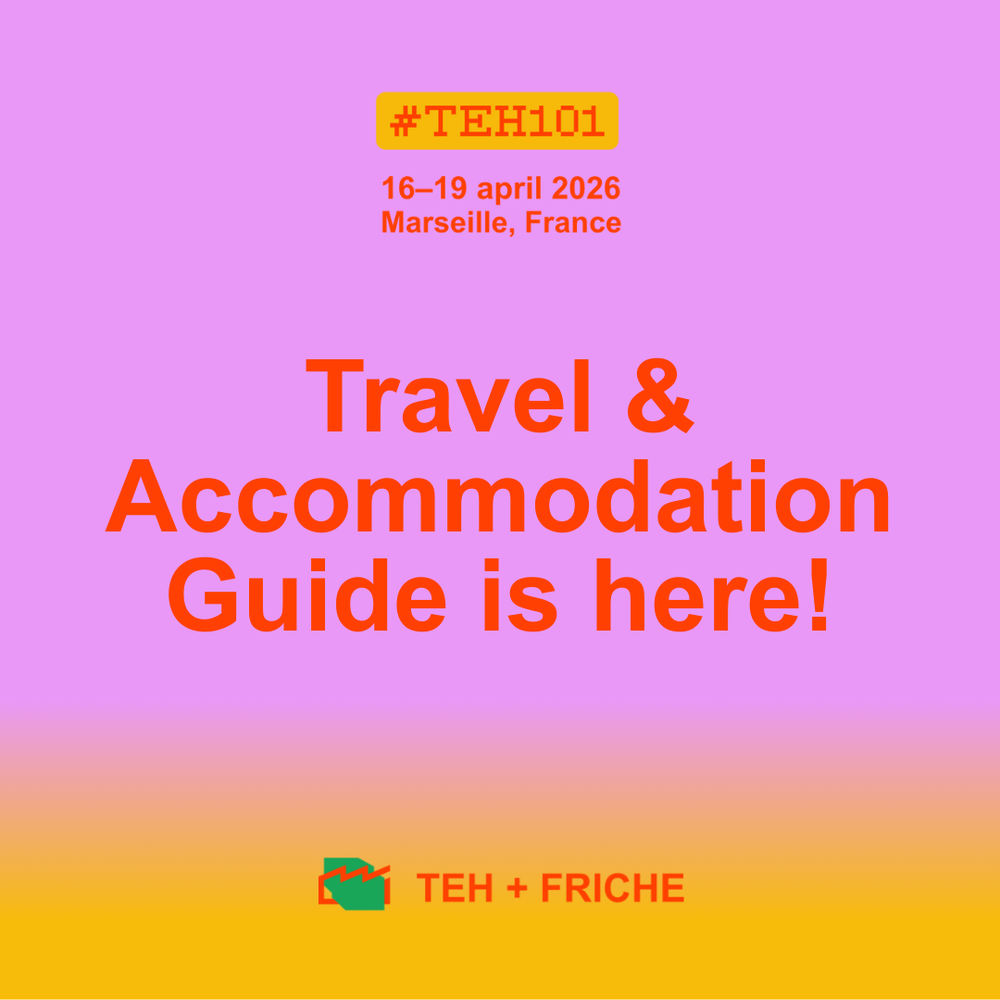
Already secured your #TEH101 ticket?
Explore #TEH101 Travel and Accommodation guide! It has been created by La Friche team to help you enjoy your stay in Marseille without the stress of being in an unfamiliar city. Inside, you’ll find everything from getting-here and getting-around tips to hotel discounts, local must-sees and key contacts, so you can relax and focus on what really matters.
Important: the last version of 19.12.2025 with the updates on the hotels.
Stay Connected!
Be part of TEH100 before it begins:
🔵 TEH101 Facebook event
💼TEH101 LinkedIN event
About the host
La Friche la Belle de Mai is a former tobacco factory that has been transformed into a cultural venue in 1992. A cultural centre for arts and innovation welcoming 450,000 visitors every year, La Friche brings together, in a unique and reinvented space, urban transformation, ecological redirection, artistic creation, connection to the territory, and active cooperation for the common good.
Born from the former Seita factory, and now a hub for creativity and innovation, La Friche la Belle de Mai serves both as a workspace for its 70 resident organizations and as a venue for public programming.
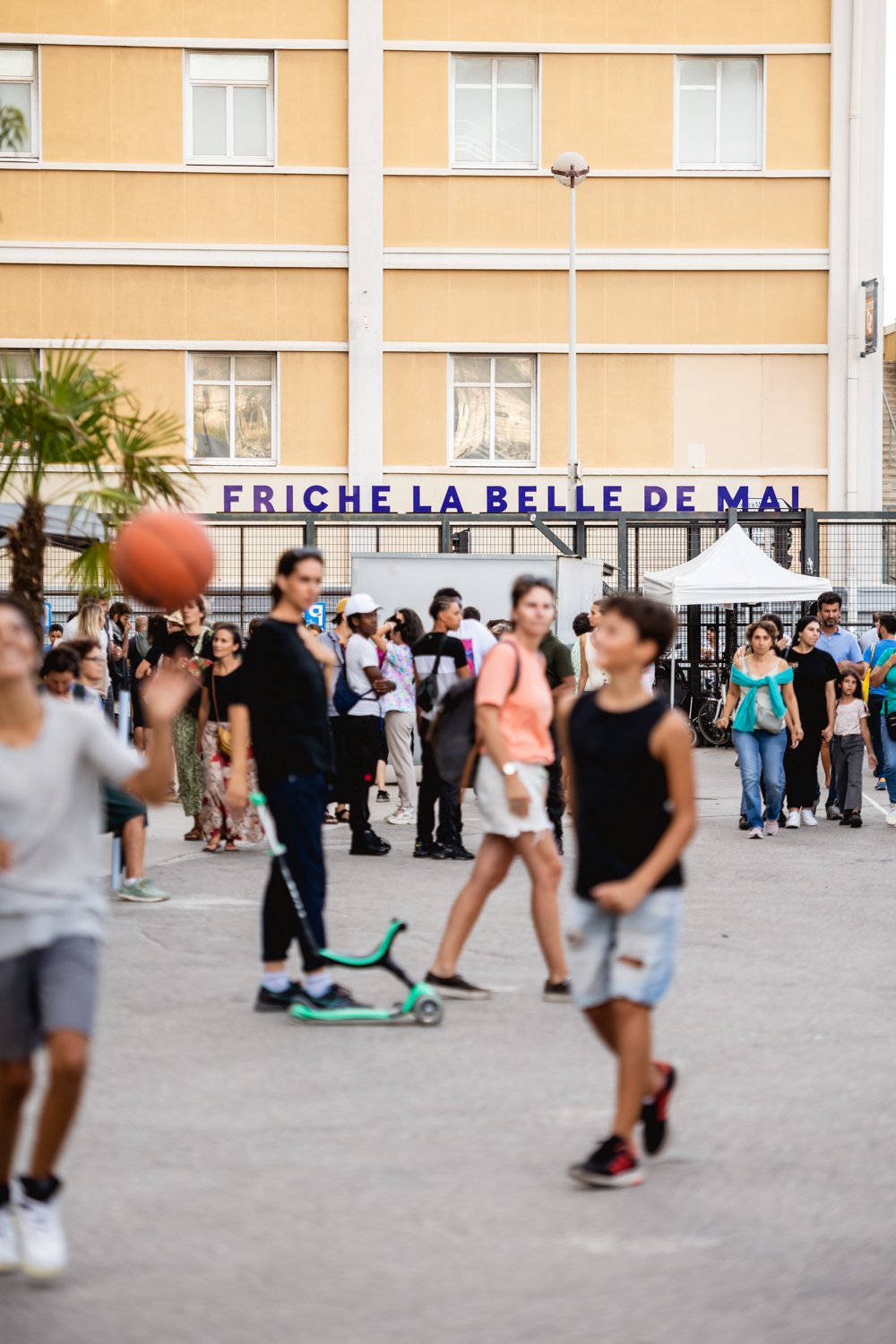
La Friche la Belle de Mai is a space where art and culture are created, produced, shared and showcased. But it is more than just a space, it is "a neighborhood" where one can stroll through the streets, relax in public spaces, enjoy a meal or coffee at the café and restaurant Les Grandes Tables, drop off a child at daycare or take them to the playground, buy fresh produce at the farmers’ market, or even grow your own fruits and vegetables in the collective and family gardens.
Thanks to its size and wide range of spaces, La Friche can offer workspaces to artists and also allow for the simultaneity of projects. Here, sculptors, actors, painters, photographers, dancers and producers can all take the time they need to develop and produce their work.
La Friche’s philosophy is simple: "culture is for everyone", with the encouragement to combine artistic practices and the general publics. These values are reflected throughout the centre's year-round artistic programming.
Cultivating an urban space is a delicate and constantly evolving process, and one of La Friche’s "raison d’être" has always been to develop flexible and adaptable frameworks. Ecological awareness and sustainability, challenging established norms and procedures, along with experimentation and a collective mindset, are central to its urban and architectural approach, exemplified by the greening of the city through community gardens and landscaped public spaces.
- 450,000 visitors each year
- 100,000 m² surface area
- 8,000 m² rooftop terrace (open during the summer for concerts, music festivals)
- 2,500 m² of exhibition space
- 6 performance venues, including 3 concert halls (which can welcome between 300 and 5,000 visitors)
- 600 events organized annually
- 400 residents (permanent or temporary)
- 20 rooms for artists in an on-site hostel
